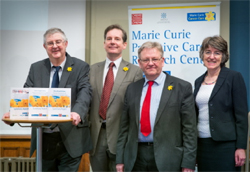Health Minister Hails The Work Of Marie Curie Palliative Care Research Centre
 Minister for Health, Mark Drakeford AM, has commended the vital work of the Marie Curie Palliative Care Research Centre, Cardiff, and its commitment to increasing Wales’ knowledge and understanding of ways to improve the care that terminally ill people receive.
Minister for Health, Mark Drakeford AM, has commended the vital work of the Marie Curie Palliative Care Research Centre, Cardiff, and its commitment to increasing Wales’ knowledge and understanding of ways to improve the care that terminally ill people receive.
In an event held at The Pierhead Building in Cardiff Bay last week, which the Health Minister attended, Marie Curie Cancer Care announced it has renewed the Research Centre’s funding for the next three years, enabling them to stay at the forefront of palliative care research development in Wales.
Minister for Health, Mark Drakeford AM, welcomed the news and praised the Research Centre’s approach to collaboration and bringing the patient’s voice to the fore. He said: “I am hugely supportive of Marie Curie’s work. I know first hand how hard its staff works – not just providing nursing care but also emotional and practical support during a very difficult time in people’s lives.
“One of the key aspirations of the Welsh Government’s End of Life Care delivery plan is to support continued education of professionals and encourage them to participate in and conduct research. I know how much importance Marie Curie attaches to research and am very grateful for their investment in this centre.”
Since its inception in 2010, the Marie Curie Palliative Care Research Centre, based within the Wales Cancer Trials Unit, has attracted £5m of external funding, bringing inward investment into Wales and creating new research posts. The additional funding from Marie Curie for the period 2014-2017 will enable the Centre to fund the existing core team and a programme of research in the following key areas, as well as employing up to 20 externally funded research staff:
- Patient and Carer experience – exploring exactly what patients and carers think of the treatments that the Centre is researching, and also what they think of being part of the research.
- Rehabilitation – considering how best to help patients keep as much physical function and independence as they can, for as long as they can.
- Thrombosis (blood clotting) – finding new ways of how important this problem is in palliative care and what may help.
Dr Bill Noble, Medical Director, Marie Curie Cancer Care, said:
“The Marie Curie Palliative Care Research Centre has been at the forefront of palliative care research development in Wales since its inception. We want them to continue work on their particular areas of expertise including rehabilitation, qualitative analysis of clinical trials, lay involvement in palliative care research and prevention of thromboembolism in palliative care. We are impressed with their strong working links with the Marie Curie Hospice, local hospital services and the Wales Cancer Trials Unit.”
Dr Anthony Byrne, Director of the Marie Curie Palliative Care Research Centre, said:
“The funding we have received from Marie Curie is vital in us being able to increase the number of studies available to patients and staff. We will continue to give a clear message that terminally ill people want to take part in research and that they should have access to an equivalent number of studies as people with cancer, cardiac, respiratory and neurological problems. Through our research and teaching activities, and the links we make with key leaders in palliative care, we will place our research results where they are needed, such as in the education and training of those who will deliver care to patients, and within the minds of those who are responsible for policy decisions.”
The Centre continues to work closely with the Palliative Care Implementation Board to ensure that it drives clinical research activity and helps deliver evidence-based change across all end of life care settings in Wales. It has also collaboratively developed a unique web-based Research Governance Toolkit to support independent hospices’ participation in clinical research.




